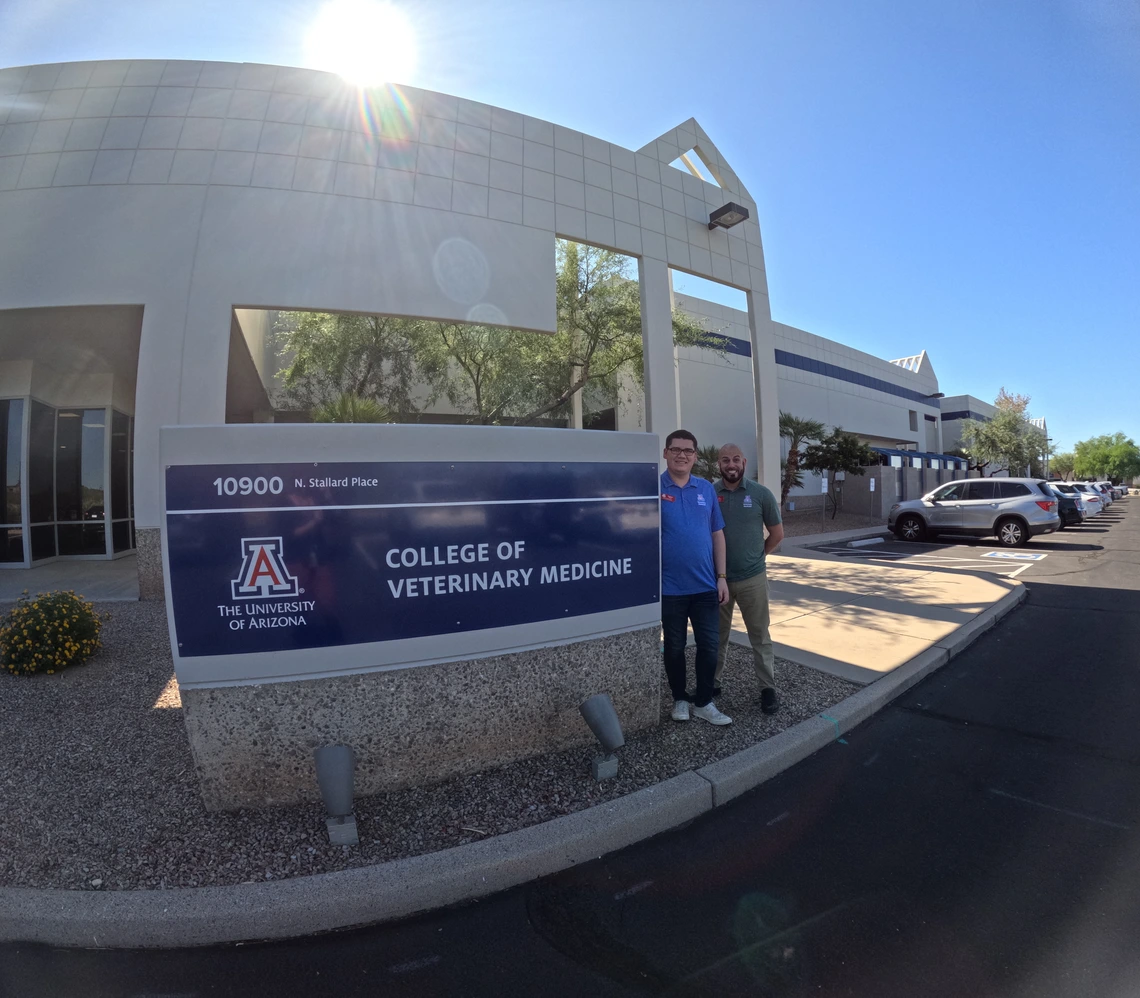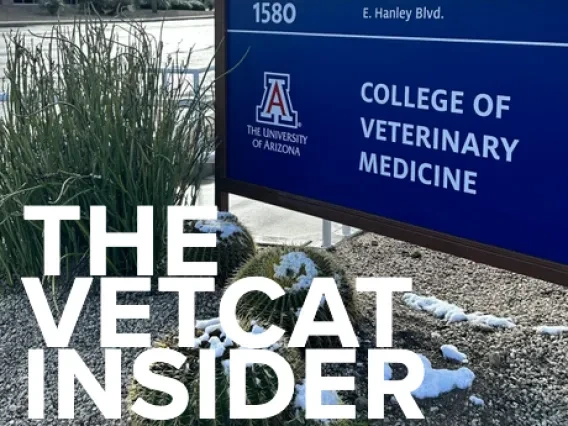Cultivating Financial Wellness Mindsets
The Financial Aid team at the University of Arizona College of Veterinary Medicine intends to create opportunities to teach students how to overcome that mindset and reframe the conversation about finances.

For many professional students, conversations around financial aid and debt can manifest anxiety, often leading to avoidance and compounding emotions surrounding this significant issue, particularly in veterinary medicine. The reality of acquiring debt and managing loans is a challenging topic. Still, our Financial Aid team at the University of Arizona College of Veterinary Medicine intends to create opportunities to teach students how to overcome that mindset and reframe the conversation about finances. In a society where many feel chained down by student debt, our team's goal is to engage and teach students how to reinforce healthy approaches to financial responsibilities during their educational careers to create long-term personal and professional success.
The Arizona College of Veterinary Medicine Financial Aid team, led by Financial Aid Director Keyshia Conner, M.Ed., MBA, desires to alleviate the stigma around financial conversations and foster a culture where students feel confident to tackle their finances. Conner replied when asked what her vision for the department was, "[that students learn] to make their finances second nature. So, when you say financial aid or financial wellness, they're not shying away from it, and it doesn't scare or intimidate them." This vision, in part, has come to fruition because of the "dream team" Conner has put together over the last several years. The Financial Aid team consists of Assistant Director Rey Morales, who brings over 15 years of financial aid experience and a robust knowledge of rules and regulations that help keep processing and day-to-day operations running efficiently, along with Senior Coordinator Matthew Rash, MPA, who completes the team with his ability to finesse the finer details and brainstorm down-to-earth opportunities where students can engage. Together, the three have created a cohesive and robust financial program that focuses on the economic well-being of individuals during their entire lifecycle as a student, from prospective status through becoming an alum.
Financial Education
Student debt in Veterinary Medicine has been a topic of ongoing discussion within the profession for years, with many schools and programs working to curb the extraordinary financial burden. While our program offers several financial support options through scholarships, Conner has prioritized educating students about their fiscal responsibilities. Before matriculating into the program, each student meets with the Financial Aid team to discuss their budget and answer questions. This initial connection sets the tone for students' regular interactions with the team and creates an open-door conversation for them to feel comfortable interacting and asking questions. In Rey Morales's words, "finances can seem very daunting because [students] have no steady income coming in, and that's why we try just to put on just the friendliest face that we can and help them to understand the policies and procedures." Conner, sharing why it is essential to make a positive first interaction with students, stated,
"Coming into the program, it is very important for us to meet with all the students. Rey, Matthew, or I will review their budgets and answer questions like, can I claim consumer debt in my financial aid? What happens if I run out of money? That [initial meeting] is the setup for what happens to them in the rest of the program. And so, from that meeting, when they get to Orientation, they'll get a budget book to translate that budget into to work on and readjust."
After the initial few weeks of Orientation and classes, students are introduced to lessons on financial responsibility as part of their professional development courses. First-year students discuss topics such as interest rates, consumer debt, and the consequences of taking loans without knowing the long-term impact on their debt-to-income ratio. The most important aspect of the course is the discussion around repayment and the terminology related to interest and principal payments, which encourage students to actively participate and create plans based on their financial status and current debt. For Conner, education is the key to helping students leave our program as financially healthy individuals, capable of avoiding potential financial pitfalls in their professional and personal lives.
"My mission is to make sure that when our students leave this program, although our tuition and our average are a little bit higher, to make sure that they're able to eat a meal with their colleagues. When you go out to lunch, no one needs to pick up your tab because you're counting pennies or the fact that you may want to drink a soda or have a coffee, and you can't worry about that because you're worried about student loans. So, no matter where you are in your debt or where you are in your finances, everybody can learn something that's going to help them once they graduate."
Borrowing Responsibly
The benefit of having an engaged and knowledgeable onsite Financial Aid team is the direct access provided to students, particularly when individuals are struggling to make decisions about acquiring or managing their debt. As someone well-versed in policies and procedures, Morales is equipped with educational finance experience, which allows him to help students avoid the typical "debt trap" that befalls many professional students.
"[Students] have all these expenses, and for [individuals] who are not working, these loans feel all-encompassing and get to the end of the road and you're like, oh man. You sometimes [forget] that this is money you have to pay back with interest. That's why it's important [for us] to stay in tune with what's going on with the Department of Education because there are always new things happening in financial aid."
While loans can feel like a payout initially, our finance department encourages students to see beyond the initial lump sum and think about their long-term financial goals. For Morales, this means prioritizing expenses. He suggests finding ways to use debt issuances to a student's advantage, like paying out several months' worth of rent so you can have a more accurate view of your expenses after covering the essentials. Additionally, it's learning to recognize what loans can be used to cover or not cover. For example, while a vacation paid for by loans seems enticing (particularly in a year-round program), it differs from a fiscally responsible (or honorable) usage of funds. The good news is that while debt can feel debilitating or inhibiting to future plans, it is not the entirety of one's story.
Looking Ahead
As Conner likes to remind students, their decision to take out three years' worth of loans is a short chapter in the much longer story of one's life. While it is easy to feel overwhelmed by the numbers in a loan account, there are ways to prepare and plan for the next steps. Conner’s helpful advice is to develop habits early on that will help establish a financially healthy lifestyle.
"Students who come to this profession have a sense of their future passions. So, if you start living minimally before you get here, it will be a smooth transition [financially]. Nor will it be a hard transition when you have the loans and you're leaving the program. Plus, once you get that job and you get all that money, it will then be easier to pay back. [Learn to] live minimalist and enjoy it."
For Morales, budgeting and forecasting for future experiences in school and after graduation are the keys to a balanced lifestyle.
"Budget, budget, budget. It's very enticing, so enticing to go and spend, but I can't tell you how many times we're approached by students at the end of a term needing money for rent, or other essentials. [It's important to know everything [you’re] going to have to pay, both direct and indirect costs that are associated with attending school, while making sure you're going to have money to last you throughout the program."
The good news is that students have a professional and experienced team to help them through a financially stressful time and offer encouraging solutions to complex problems. The most important takeaway is that individuals shouldn't feel discouraged or overcome by their financial state. Every person's journey is different. Sometimes, unexpected circumstances lead us down paths we didn't anticipate. This is why keeping a healthy perspective on your financial situation is essential. Matthew Rash, when asked to share his best advice for students dealing with financial decisions, shared,
"Be kind to yourself. If you know that [veterinary medicine is] your passion, and you know it in your heart and that's what you want to do, but taking loans is the only way to do it, you have to do what's best in that moment. That doesn't mean taking everything just because it's there. If you need to take it all, that's fine, but be kind to yourself and remind yourself that if that's the only option to do it, there is going to be a way to get through it. It's not going to be the bond chain on you forever."
For more information about our Financial Aid team and their services, visit our website linked below.

Like this article? Learn more about our program in our winter edition of the VetCat Insider.
